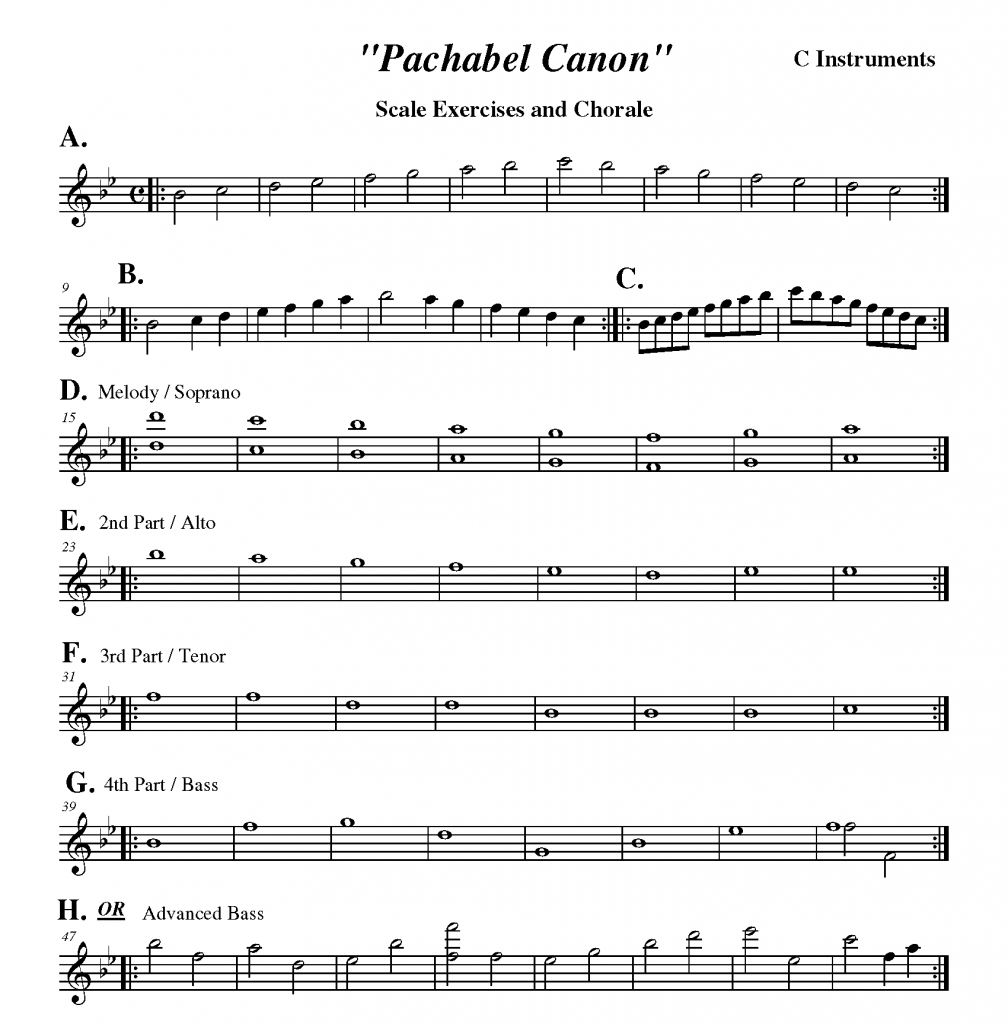Project Title: “Pachabel Canon” in Bb Major
Instructions: Let’s have some fun. There are some songs that you do not improvise using a “blues scale”. We will keep this one real simple, and improvise this one using your concert Bb major scale. Also in “ballad” improvisation, such as this, use a lot less syncopation. Stick with basic subdivisions of quarter, eighths, and sixteenth notes, constantly slowing down and speeding up your note “velocities”. Keep your note velocities fairly random and NEVER be predictable. Have fun.
"Pachabel Canon" Resource Audio File with Count-Offs:
Assignment #5 (continued)
Project Title: “Pachabel Canon” (in “Bb” Major) Scale Exercises and Chorale
The “Pachabel Canon” Scale Exercise and Chorale PDF coincide with its audio file, which is played at a fairly fast four beat per measure tempo. The first three warm ups are leveled offering your students different levels of challenge playing the concert Bb scale, but can also be played in combination, for more “independent part playing” practice. Exercises “D” through “H” are a four part chorale looped throughout the entire audio recording. It is suggested that you wait the first eight bars (to establish the tempo and performance style) and then enter in unison, or in layers, however you may want to do it. You might consider entering the four chorale parts one at a time, possibly even taking turns “singing” their parts for some very fundamental ear training and pitch matching. The last two lines (“G” & “H”) are both the bass line at two different difficulty levels. You should only play one or the other.
Project Title: “Pachabel Canon” An Introduction to Improvisation Using the “Bb” Major Scale:
The Three Basic Rules for Beginner Improvisation:
– “NO SKIPPING”! Never skip over any note in your scale.
– Try to (as best as possible) not repeat any rhythms in your solo.
– If a note sounds bad, DON’T PLAY IT!!!
Progression Sequence:
* Play exercise line “A” being sure the student(s) plays the 9th step of the scale before coming back down.
* Variation #1: Encourage soloists to vary note lengths, ranging from half notes, to quarter notes, to eighth notes and possibly even 16th notes.
* Variation #2: When playing your solo you can now extend your range, below the tonic and above the 9th. Note: this is a very minor incremental step and can be ignored or combine with the variation before or after.
* Variation #3: “Noodling” Noodling is where you can randomly reverse directions whenever you want. In other words, not playing the scale in its original sequence. The impression you want to give the audience is that your solo is “unpredictable”. HOWEVER! (at this level) it is very important that the soloist still never skip over any notes of the “Bb” major scale.
Note: Students should be highly encouraged to record their solos using “Audacity”, “bandlab.com”, “Red Cool Media Editor”, or any other recording/sequencing software. You can make MP3s available to your students and (in all three apps/softwares) importing an audio file is fairly easy.
